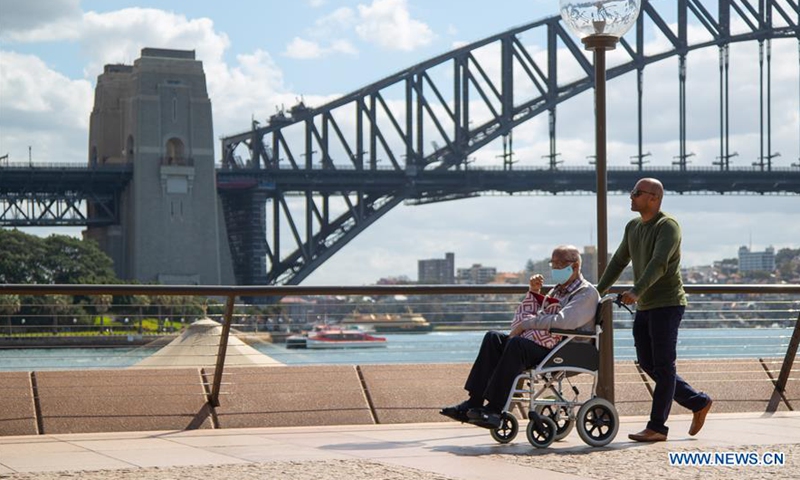Chinese nationals 'racial target' in Aussie amid pandemic: survey
By Xu Keyue Source: Global Times Published: 2020/9/17 20:26:18

Tourists are seen near the Sydney Harbour Bridge in Sydney, Australia, Sept. 1, 2020. Tourism in Australia has been heavily impacted by the COVID-19 pandemic. (Xinhua/Hu Jingchen)
A new survey published on Thursday reveals that Chinese people living in Australia are the most deeply affected group by racism in the form of verbal abuse and ostracism due to their appearance amid the COVID-19 pandemic, a finding that was widely echoed by Chinese studying and living in Australia reached by the Global Times. They challenged the country's so-called safe and welcoming image.
The report, titled "As if we weren't humans: The abandonment of temporary migrants in Australia during COVID-19," is the latest finding from a July online survey of 6,105 international students and Australian visa holders on their experience in Australia during the pandemic.
The University of New South Wales and University of Technology Sydney published the report on the website of their joint project known as the Migrant Worker Justice Initiative.
According to the survey, more than half of Chinese mainland respondents said that since March 1, they had experienced racism in the form of verbal abuse and/or people avoiding them because of their appearance, ranking top among the respondents. Thirty-five percent of those hailing from the Chinese mainland had been verbally abused - a substantially higher proportion than other nationalities.
A 23-year-old Chinese woman who enrolled in a master's program was quoted in the report as saying that "I was treated as a cash cow, the [Australian] government only wanted us to pay the full tuition and pay the high tax and they won't provide any help or support to us."
Residents of other East Asian and Southeast Asian countries and regions reported the next highest incidence of racism, with more than 40 percent having experienced similar racial abuse, said the survey.
A Chinese national surnamed Yang at the University of Queensland, who has been in the country for more than one year, told the Global Times on Thursday that she felt stunned and hurt when first cursed by a local young stranger who yelled "China virus!" in April, as she had heard that the country is inclusive and welcoming.
However, apart from the verbal abuse, Yang said many posters featuring racist attacks are mounted on the campus, and most of them target Chinese students. There are also local news reports of physical racially based attacks against Chinese.
The terrible experience casts a shadow over Yang, so that now every time she goes out wearing a mask, she will make a detour or avoid close contact with locals when seeing them approach.
"I really don't know what they're going to do when they pass."
Several Chinese students reached by the Global Times said they had suffered similar racial attacks and felt particularly negative about their experience in Australia during the pandemic.
Many complained that racial attacks surged amid the pandemic, mostly because of Australian politicians' and local media outlets' hype over the origin of the COVID-19, based on political bias.
An anonymous Chinese-Australian who was born in Australia and can't speak Chinese was also abused by a local's hate speech only because he "looked Chinese."
Australia's "safe and welcoming" image apparently is facing big challenges.
A Chinese-Australian surnamed Du who has been in the country for about 10 years said most of his friends from China were disappointed over the discrimination after coming to Australia, and he would not recommend that other Chinese students choose Australian universities.
Du noted that local schools are eager to deny claims of racism because they care about Chinese students' money, not their real situation.
It seems that most universities positively joined campaigns against racism and other discriminations, but they know the campaigns will not solve the problems. Animosity against Chinese is broad, Du said, noting that many universities join such campaigns as "just a gesture."
The survey also exposed reputational damage to Australia's higher education and tourism markets.
Among international students, graduates and working holiday makers, 59 percent indicated that following their experiences during the pandemic, they were less likely or much less likely to recommend Australia as a place to study or have a working holiday.
China's education authority issued an alert in June to Chinese students who were about to study, or prepare to return to Australia for their studies, after the country saw a spike in racial discrimination against Chinese people amid the COVID-19 pandemic. Another alert against travel to Australia was issued by China's national authority in June.
Posted in: DIPLOMACY,CHINA FOCUS